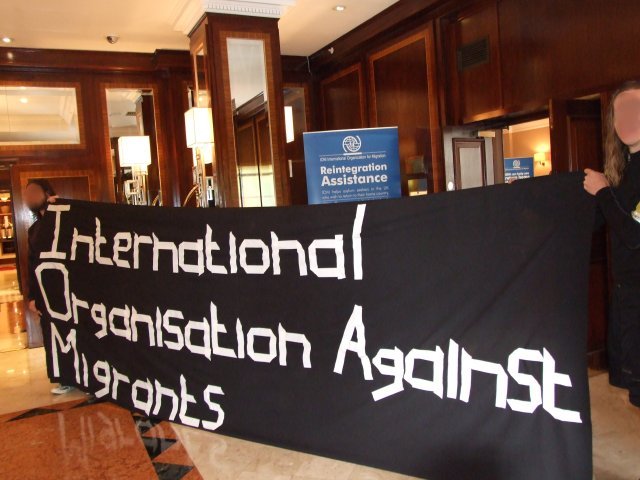IOM Unwelcome in Birmingham
IMC Birmingham | 15.07.2008 23:03 | Migration | Birmingham
The International Organisation against Migration, aka the International Organisation for Migration or IOM, held a 'conference' in Birmingham last month in preparation for opening a new regional office in the city. A handful of local activists did a banner drop at the four-star hotel where the event was held to unwelcome the dodgy organisation. They also gave out leaflets to the delegates to tell them the truth about IOM, whose real mission is to help Western governments 'manage migration' and meet their deportation quotas.
Reports: IOM Unwelcomed in Birmingham | IOM's new Birmingham office | Inside the IOM Birmingham conference | IOM Bribing Asylum Seekers to Return Home | The So-Called Voluntary Return
Related: Shadowy deportation organisation opens office in London | New Home Office Scheme Against Asylum Seekers in Glasgow | IOM Picket in Bristol | No Platform for the IOM (Bristol) | No Border's IOM page

International Organisation *Against* Migrants
The IOM was founded in 1951, under the leadership of the USA, mainly with the intention of creating a counter-agency to the UN High Commissioner for Refugees (UNHCR). Unlike this, IOM does not have a Protection Mandate for its work with refugees and displaced persons and is not really accountable to anyone. From the beginning, the 'agency' has not been based on humanitarian principles but on economic considerations; its core policies are not concerned with the well-being of people but the well being of (Western) economies. During the Cold War, the Intergovernmental Committee for European Migration (ICEM), as IOM used to be called then, was instrumental in the manpower and brain drain from Eastern and Central European countries into Western Europe. It was as instrumental in the formation of ethnically or religiously defined nation-states in the Indian subcontinent and Eastern Africa. With the 'help' of ICEM, ethnic Asians were evacuated from Uganda, Muslim Indians were settled in Pakistan and so on and so forth. Over the years, IOM has assumed the function of a transnational organisation that controls, or helps control, global migration. (For the official history of IOM, see here; for an alternative history, see here.)
Today, with 125 member states and a further 16 states with observer status, IOM has offices in over 100 countries. One of the undeclared functions of these branches is to serve Western governments as a "migration warning system", which makes sure that they are informed in advance about upcoming "mass migration flows". In the late 1990s, for example, the IOM used to publish a bulletin called Trafficking in Migrants, which contained extensive information on migration routes, clandestine methods, networking activities and such like.
IOM's role in 'migration management' is not confined to information, however. Through its Technical Cooperation on Migration (TCM) division, it provides governments and other agencies with technical, intellectual and strategic tools to "enhance their migration management capacities". Further, it has become an 'alternative agency' that helps Western governments meet their deportation quotas wherever deporting unwanted migrants is too costly, difficult or where they want to avoid their human rights obligations under international law.
In the UK, IOM started to operate in 1999. It was IOM who went to the UK government and told them, in the aftermath of the Kosovo war, that there are Serbs here who want to go back home but don't have the means to. And so it was: IOM 'helped' them return or, rather, helped the UK government get rid of them, starting a close cooperation that would last and grow over the years. In the nine years since 1999, IOM has 'assisted' more than 27,000 people to 'return' to some 130 countries from the UK.
In a remarkable move in 2002, Amnesty International and Human Rights Watch challenged the politics of IOM in a relatively strong joint statement that said: "In particular, we are concerned that IOM's work in certain contexts is adversely impacting upon basic human rights of migrants, refugees and asylum seekers, including for example the right to be free from arbitrary detention and the fundamental right to seek asylum." It followed an earlier joint motion by Human Rights Watch, International Catholic Migration Committee and the World Council of Churches, which was passed to a UNHCR conference in June 2001. Other international organisations, such as the Roma National Congress in Germany (RNC), have expressed stronger criticisms. It is quite significant that the RNC dubbed IOM as "the enemy of the Roma people" and accused it, back in 2001, of playing a crucial role in "expelling" the Roma from Western Europe and "breaking the collective resistance" by arranging their travel individually. (See here for more criticisms of IOM.)
IMC Birmingham